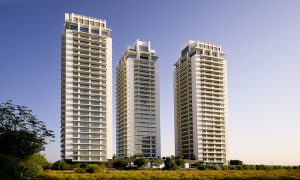Spierings introduces world’s first zero-emission hybrid mobile crane
Dutch manufacturer says new compact and flexible SK487-AT3 ‘City Boy’ is highly suited for working in city centres and urban environments

Mobile tower crane specialist Spierings Mobile Cranes has launched the world’s first hybrid model that combines zero-emission driving and operational capabilities to provide a flexible solution for urban environments.
The Netherlands-based manufacturer said its new SK487-AT3 City Boy crane, launched just before the European lockdowns commenced last month, could play a key role in alleviating nitrogen emission issues at job-sites and urban centres in Europe and elsewhere in the world.
Koos Spierings, CEO of the company, said: “Hoisting equipment manufacturers and the construction industry have been eagerly looking forward to this moment,” while launching the City Boy at an event attended by representatives from the business community and government, while four Dutch crane fleet owners were presented with their first crane.
Spierings Mobile Cranes, based in the town of Oss, has already received 60 orders for the new crane to date and Koos Spierings added: “It shows there’s a substantial demand out there for this type of vehicle, which I would attribute both to how compact and flexible it is – making it highly suited for working in city centres – and to the fact that it is an effective solution to the problem of high nitrogen emissions. This will enable crane rental companies and construction companies to focus completely on what they do best: building.”
George Raessens, deputy chairman of the trade association for the Dutch construction industry, said: “We’re on the cusp of a new era, both because we now have a vehicle with zero-emission capabilities – for which there is a huge demand – and because this will inspire the market and the political class to follow suit. You can consider this crane the ‘Tesla of the building industry’. When the first Tesla launched six years ago it was a technological breakthrough, and now they’ve become a fixture on our roads. These cranes are expected to follow a similar trajectory.”

























